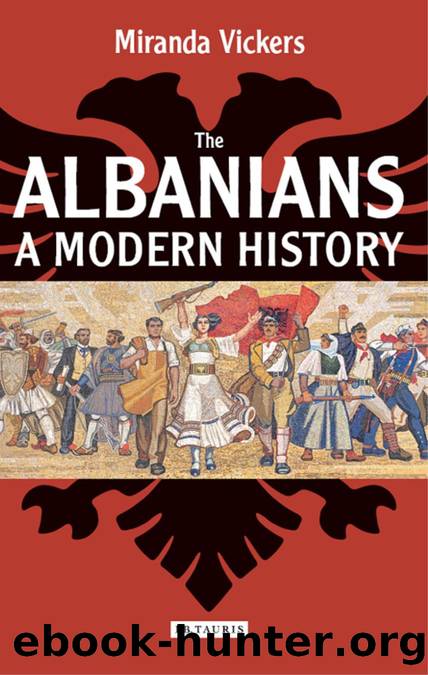The Albanians by Miranda Vickers

Author:Miranda Vickers
Language: eng
Format: epub
ISBN: 9780857736550
Publisher: Bloomsbury Publishing
Published: 2019-11-21T16:00:00+00:00
8
‘Building Socialism’ under
Yugoslav and Soviet Tutelage
When Enver Hoxha set up his government in Tirana in 1944, during the immediate aftermath of the war, he maintained the appearance of collaboration with those non-communist resistance elements which still existed and were willing to join the new Democratic Front (the renamed LNC). This organization now replaced the openly communist LNC of the war years, but the need for concessions to patriotic, nationalistic and democratic forces in the country diminished as the Communist Party tightened its hold.1 Thousands of BK and Legaliteti supporters fled the country, the majority settling in America. In December 1944 the state took control of industry, banking and transportation. The industrial, commercial and agricultural property belonging to those who had left the country for political reasons was requisitioned without compensation to the previous owners. The following summer, a new Albanian constitution was proclaimed which was virtually a carbon-copy of the Yugoslav constitution. The new Albanian government set about remodelling itself to the pattern of its northern neighbour, and despite the enthusiasm and confidence of the new regime the ACP became merely an appendage of the CPY. A customs union was created in preparation for Albania’s total merger into the Yugoslav Federation. The Albanian currency, the lek, which had been greatly devalued during the war due to rampant inflation, was tied to the Yugoslav dinar, and the study of Serbo-Croat became compulsory in Albanian schools. And so came about the virtual extinction by Yugoslavia of Albanian independence.
In the elections held on 2 December 1945, the Democratic Front won 93 per cent of the vote, which was no surprise since virtually all the candidates stood for the Democratic Front. Apparently a small number of ‘reactionary’ elements rose in opposition to the law on the elections. The most outspoken of these, Gjergj Kokoshi, demanded that candidates from outside the Democratic Front should be allowed to stand in the elections. The Front’s rank-and-file, however, dismissed this idea as absurd. One member, Siri Shapllo, replied to Kokoshi,
The fact that no other group has been able to organize itself after ten months of liberation, means that the creation of such groups has not been in the interests of the people. The people are with the Front. If there are some who want to organize themselves outside the Front, let them try, but they will run up against the strength of the Front and will lose. There is nothing we can do about this.2
Thus, according to Hoxha, Kokoshi was left in a minority of one.
Neither did there appear to be any opposition to one of the strangest clauses in the electoral law, whereby the sale and use of alcoholic drinks was banned for two days prior to the elections, and for one day afterwards. Despite massive intimidation and coercion, a minuscule number of intrepid candidates did stand in opposition to the Front. As an overwhelming majority of the population were illiterate, there were no voting papers. Instead, each voter was given a small rubber ball stamped with a black eagle.
Download
This site does not store any files on its server. We only index and link to content provided by other sites. Please contact the content providers to delete copyright contents if any and email us, we'll remove relevant links or contents immediately.
The Secret History by Donna Tartt(16623)
The Social Justice Warrior Handbook by Lisa De Pasquale(11489)
Thirteen Reasons Why by Jay Asher(7788)
This Is How You Lose Her by Junot Diaz(5771)
Weapons of Math Destruction by Cathy O'Neil(5036)
Zero to One by Peter Thiel(4824)
The Myth of the Strong Leader by Archie Brown(4789)
Promise Me, Dad by Joe Biden(4447)
Beartown by Fredrik Backman(4417)
Stone's Rules by Roger Stone(4415)
How Democracies Die by Steven Levitsky & Daniel Ziblatt(4398)
The Fire Next Time by James Baldwin(4342)
100 Deadly Skills by Clint Emerson(4076)
A Higher Loyalty: Truth, Lies, and Leadership by James Comey(4032)
Rise and Kill First by Ronen Bergman(4012)
The David Icke Guide to the Global Conspiracy (and how to end it) by David Icke(3881)
The Farm by Tom Rob Smith(3872)
Secrecy World by Jake Bernstein(3782)
The Doomsday Machine by Daniel Ellsberg(3730)
